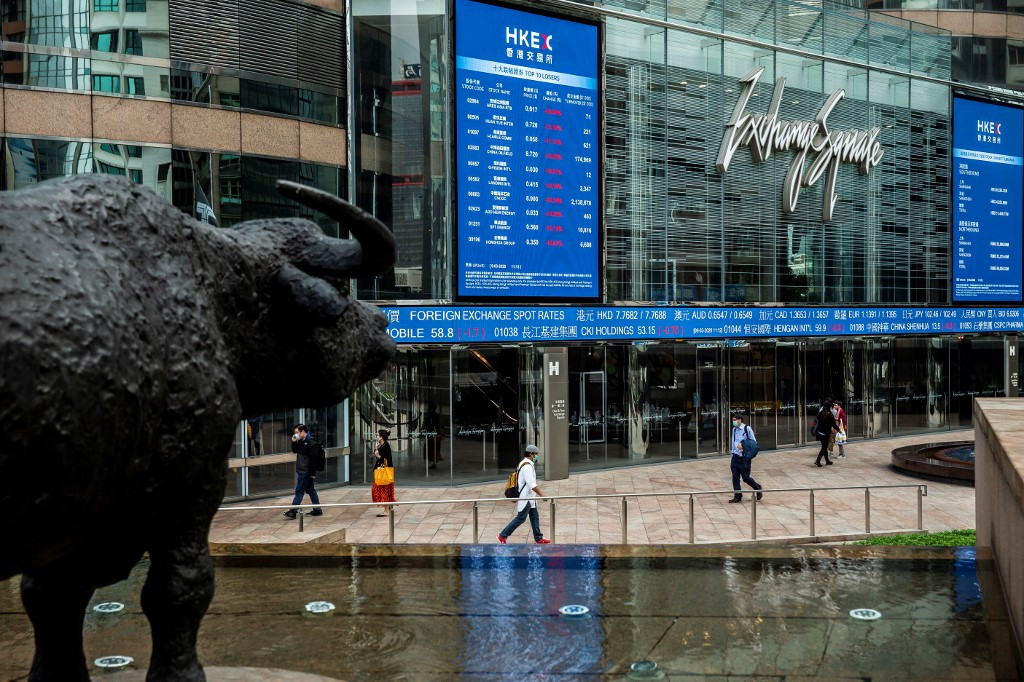Popular Reads
Top Results
Can't find what you're looking for?
View all search resultsPopular Reads
Top Results
Can't find what you're looking for?
View all search resultsAsian stocks mainly up, bond yields ease as investors weigh Fed against Ukraine risks
MSCI's broadest index of Asia-Pacific shares gained 0.27 percent, capped by declines in Japanese stocks.
Change text size
Gift Premium Articles
to Anyone
A
sian stock markets were mostly higher on Thursday while bond yields extended their decline as investors weighed risks of a Ukraine invasion against signs that the US Federal Reserve won't be as aggressive as feared in tightening policy.
MSCI's broadest index of Asia-Pacific shares gained 0.27 percent, capped by declines in Japanese stocks, with the Nikkei sinking 0.29 percent on persistent worries that Russia could invade Ukraine.
MSCI's equivalent regional index that removes Japan rose 0.64 percent.
Chinese blue chips added 0.36 percent, reversing an earlier loss. Hong Kong's Hang Seng flipped to a 0.46 percent gain.
Australia's benchmark rose 0.65 percent as higher metals prices outweighed geopolitical concerns. South Korea's Kospi leapt 1.38 percent.
US S&P 500 futures slipped 0.07 percent.
Markets remain on edge after Western countries including the US warned on Wednesday that Russia's military presence on Ukraine's borders was growing, rather than shrinking as Moscow has insisted.
At the same time, worries about a super-hawkish Fed rate-tightening campaign, potentially including a 50 basis-point hike next month, took a step down overnight after minutes of the latest policy meeting signaled a more measured, data-dependent approach from central bank officials.
The less hawkish Fed minutes are a positive sign that markets can re-adjust after previously pricing in aggressive rate hikes, said Trinh Nguyen, a senior economist at Natixis.
Money markets see about 43 percent odds of a half-point hike on March 16, and about 150 basis points of tightening in total this year.
US Treasury yields continued their retreat in Asia on Thursday, with the 10-year yield easing about 2 basis points to 2.03 percent, pressured both by bets for a less hawkish Fed and demand for safe haven assets amid Ukraine uncertainty.
The US dollar index, which measures the currency against six major peers, edged 0.06 percent lower to 95.770.
A softer dollar and lower yields combined with subdued risk sentiment helped to keep gold near an eight-month peak at US$1879.48, reached Tuesday. It last traded around $1,868 an ounce.
Crude oil retreated, though, amid optimism that negotiations will salvage Iran's 2015 nuclear deal, with US West Texas Intermediate (WTI) crude trading down $2.50 at $91.16 a barrel and Brent down $2.43 at $92.38.
Oil markets have been dominated in recent weeks by the threat of Russia invading Ukraine, with concerns that supply disruptions from the major producer in a tight global market could push oil prices to $100 a barrel.
Mizuho said any relief about Ukraine is premature, if not unfounded.
"As tensions run high and markets assess the fluid risks of Russian invasion of Ukraine, dips in risk aversion could reverse abruptly," the bank's analysts wrote in a research note.
"The fear is that Russia-Ukraine risks may become entrenched, maybe even normalized."











